 Petzlover
Petzlover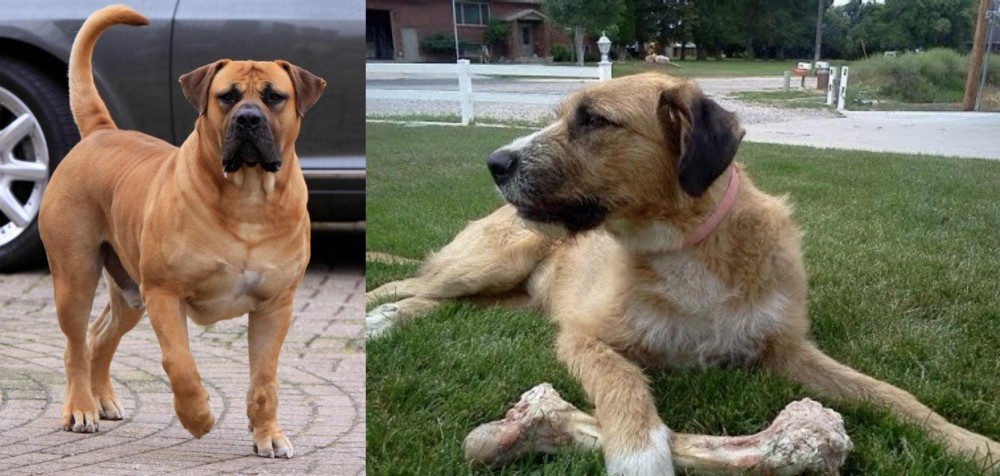 Boerboel is originated from South Africa but Irish Mastiff Hound is originated from United States. Boerboel may grow 21 cm / 8 inches shorter than Irish Mastiff Hound. Boerboel may weigh 16 kg / 36 pounds more than Irish Mastiff Hound. Both Boerboel and Irish Mastiff Hound has same life span. Both Boerboel and Irish Mastiff Hound has almost same litter size. Boerboel requires Low Maintenance. But Irish Mastiff Hound requires Moderate Maintenance
Boerboel is originated from South Africa but Irish Mastiff Hound is originated from United States. Boerboel may grow 21 cm / 8 inches shorter than Irish Mastiff Hound. Boerboel may weigh 16 kg / 36 pounds more than Irish Mastiff Hound. Both Boerboel and Irish Mastiff Hound has same life span. Both Boerboel and Irish Mastiff Hound has almost same litter size. Boerboel requires Low Maintenance. But Irish Mastiff Hound requires Moderate Maintenance
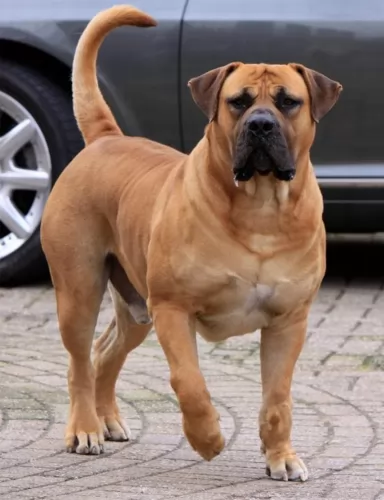 The name ‘Boerboel’ is derived from an Afrikaans/Dutch word, and the large Boerboel dog from South Africa has been specifically bred to be a farmer’s dog. Bred also to be a strong guard dog, the Boerboel is a mix of different African and European breeds, which in all likelihood, will include the Bullmastiff, the Rhodesian Ridgeback and the Bulldog. These dogs were used to hunt baboon and leopard.
The name ‘Boerboel’ is derived from an Afrikaans/Dutch word, and the large Boerboel dog from South Africa has been specifically bred to be a farmer’s dog. Bred also to be a strong guard dog, the Boerboel is a mix of different African and European breeds, which in all likelihood, will include the Bullmastiff, the Rhodesian Ridgeback and the Bulldog. These dogs were used to hunt baboon and leopard.
There is some information that suggests that the Boerboel was brought to South Africa by Jan van Riebeeck in 1652. Other information suggest that the dog is a descendant of the old Boer Hund, a powerful animal which was invaluable to the farmer.
In was in January 2010, that the American Boerboel Club was elected as the AKC’s Parent Club. The Boerboel was accepted into the Miscellaneous Class in the Working dog group.
 The Irish Mastiff Hound is a huge dog – a mix of the English Mastiff and the Irish Wolfhound.
The Irish Mastiff Hound is a huge dog – a mix of the English Mastiff and the Irish Wolfhound.
Both of these dogs have been around for a long time and actually have ancient histories. The Mastiff for instance has origins that date back to ancient times in China, while the Irish Wolfhound has origins that date far back to 391 AD.
Today this dog is regarded as an excellent companion for any home.
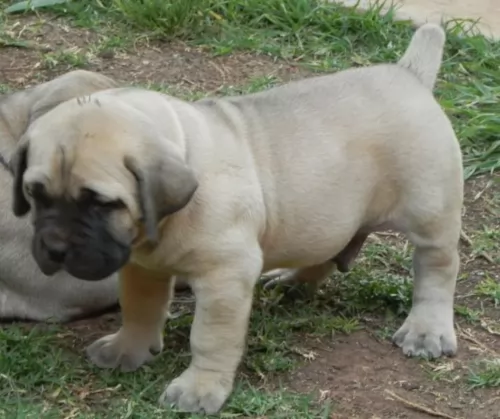 The Boerboel is a big, strong dog with powerful muscles. His height is between 61 – 66cm. He is similar looking to the Boxer dog, just heavier and bigger. The head of the dog is broad and big and the short, smooth coat can be of various shades, with breeders trying to achieve a single color of light tan and with no white. Their coats can also be red, different shades of brown and brindle.
The Boerboel is a big, strong dog with powerful muscles. His height is between 61 – 66cm. He is similar looking to the Boxer dog, just heavier and bigger. The head of the dog is broad and big and the short, smooth coat can be of various shades, with breeders trying to achieve a single color of light tan and with no white. Their coats can also be red, different shades of brown and brindle.
The dog has a black facial mask and the eyes are brown with the ears being of medium length and floppy. The Boerboel’s tail has always been docked, but today breeders are keeping the tail long. Many Boerboel lovers object to this, saying it detracts from the distinctive look of the Boerboel.
The Boerboel can be a wonderfully loyal and loving pet to their owners. They are territorial dogs and suspicious of strangers. This is a dog where it is imperative that they receive training and socialization as a puppy. They have leanings towards being aggressive so they wouldn’t be recommended to first time dog owners, unless of course the first time owners are firm and strong.
Boerboels raised the right way can be gentle giants. They often get bad publicity as regards to aggression, but this is because of they way they have been raised. Boerboels have been bred to be tough and fearless and they make excellent watchdogs. When raised and trained correctly, they make awesome, devoted companions, even around children and other pets.
 This is a large crossbreed which can stand at 85 to 91 cm in height and weigh in the region of 47kg to 74kg.
This is a large crossbreed which can stand at 85 to 91 cm in height and weigh in the region of 47kg to 74kg.
He essentially has the short, smooth coat of the Mastiff but other dogs may well inherit the longer, more wiry coat of the Wolfhound. Coloring of the coat can be quite varied and can be brown, grey, white, tan or black. Some dogs take more after the Mastiff while others have more Wolfhound characteristics. They have a large head, some have a somewhat wrinkly face because of the Mastiff side, the ears are fairly small and floppy and the tail is long.
Even though they're so huge, these are easy going dogs that are able to fit in well with most human families. Described as gentle giants, they are loving, loyal, easy-going, even-tempered and eager to please.
The Irish Mastiff does well in the city or in the country because he isn't particularly active and will be happy to have a comfortable spot to lie close to you, however with such a large dog, you will certainly need a garden.
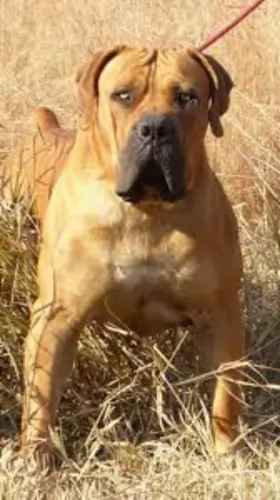 A well trained, socialized Boerboel makes a splendid pet. This is one breed known to have excellent guard- and watch dog characteristics. Boerboels are known for being protective when necessary. When not on guard, they make wonderful pets. He’ll need plenty of exercise, but he loves to also spend time indoors with his human family.
A well trained, socialized Boerboel makes a splendid pet. This is one breed known to have excellent guard- and watch dog characteristics. Boerboels are known for being protective when necessary. When not on guard, they make wonderful pets. He’ll need plenty of exercise, but he loves to also spend time indoors with his human family.
This a a bold, fearless dog who becomes devoted to his family. With the right training he is obedient and affectionate and knows how to behave appropriately indoors- and outdoors. For such a big dog, the African Boeboel’s temperament can be surprisingly gentle and affectionate around the family that he loves.
 Your big Irish Mastiff Hound is cool, confident and calm. He isn't particularly energetic and as long as he gets a nice walk as well as some mental stimulation, he'll be happy, wanting to spend a good part of the day lying close to where you are.
Your big Irish Mastiff Hound is cool, confident and calm. He isn't particularly energetic and as long as he gets a nice walk as well as some mental stimulation, he'll be happy, wanting to spend a good part of the day lying close to where you are.
Socialization and training will be good for him and he learns easily. He is just a big gentle giant who promises to make you a wonderful canine friend.
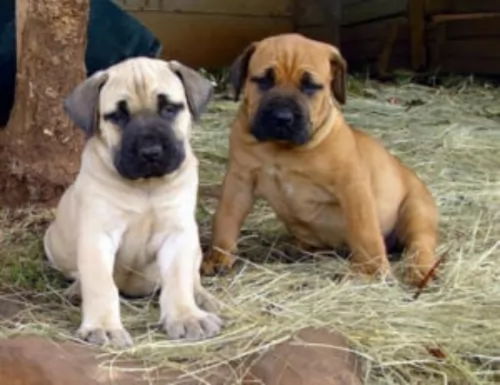 Many health problems experienced with any dog are found in the way dogs are fed, the way they are exercised and the way they are attended to when they are ill. Boerboels are healthy dogs and suffer fewer health defects than most similar breeds. The average life expectancy of a Boerboel is about 10 to 12 years. There are one or two health issues you’ll want to watch out for with your Boerboel.
Many health problems experienced with any dog are found in the way dogs are fed, the way they are exercised and the way they are attended to when they are ill. Boerboels are healthy dogs and suffer fewer health defects than most similar breeds. The average life expectancy of a Boerboel is about 10 to 12 years. There are one or two health issues you’ll want to watch out for with your Boerboel.
This aliment is typically found in large breed dogs. It’s a problem caused by a malformation of the hip joint. Over time hip dysplasia causes discomfort, pain and even arthritis and lameness. It is genetically inherited, with its severity being influenced by environmental factors. There are treatments available to alleviate the symptoms and make the dog more comfortable.
The Boerboel has plenty of muscle mass, and because he is such a large dog with a big appetite, he can lean towards obesity. Plenty of activities will be imperative to maintain muscle mass and ward off obesity. Over-eating suppresses the immune system, so over-feeding your dog simply contributes to ill health.
 Many people find giant dogs irresistible because they're usually gentle, patient and loving. However, it is their very size which makes them more prone to certain health concerns and gives them a shorter lifespan.
Many people find giant dogs irresistible because they're usually gentle, patient and loving. However, it is their very size which makes them more prone to certain health concerns and gives them a shorter lifespan.
It is why it is so important to ensure you feed your pet a healthy diet to ward off illness. A large dog like the Irish Mastiff doesn't have a particularly long lifespan, and with good care he can get to 9, 10, 11, 12 years of age.
This condition is more common in large dogs and it can lead to joint degeneration, arthritis and pain. Your pet may even be reluctant to get up and greet you when you come home which can be very sad. Vet intervention will certainly be required.
This heart disease is commonly seen in large dog breeds where the heart becomes weak so that it can't pump blood throughout the body. Coughing, difficulty with breathing, weakness and lethargy are just some of the symptoms of this disease and will also require veterinary intervention.
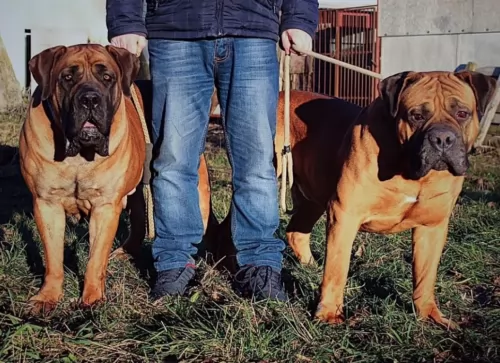 Boerboels are a robust breed and their short hair doesn’t shed heavily. Your Boerbul will require a thorough brushing twice a week to remove loose hair and to keep the coat shiny and healthy.
Boerboels are a robust breed and their short hair doesn’t shed heavily. Your Boerbul will require a thorough brushing twice a week to remove loose hair and to keep the coat shiny and healthy.
Boerboels, just like any other dog, should have their teeth brushed regularly to prevent tartar and plaque build-up. Left unattended, your pet can battle with tooth decay and gum disease.
Your Boerboel puppy will need ‘large breed puppy’ dog food. Speak to your veterinarian about wet- or dry kibble choices. An adult Boerboel will certainly need raw meat in his diet. When you do research, you find that the best Boerboel breeders are advocates for raw feeding. Home made food with rice, vegetables and meat as well as the best quality commercially manufactured dog foods for large breeds are excellent choices but raw meat is imperative as part of every dog’s diet.
 He has a short coat, and grooming of this laid-back dog will include brushing him twice a week, trimming his nails and making sure that you check inside his ears for ear infection.
He has a short coat, and grooming of this laid-back dog will include brushing him twice a week, trimming his nails and making sure that you check inside his ears for ear infection.
Large dogs have special nutritional needs, particularly because they are more prone to illnesses such as hip dysplasia. You want to make sure that the foods he eats are rich in Omega-3 fatty acids, glucosamine, chondroitin, amino acids and antioxidants because these will ensure proper joint health.
You've got to be careful what you feed a large breed dog because of the weight management issue too. Excess weight puts stress on the joints and promotes the development of osteoarthritis. Speak to your vet about portion control and meat protein for your pet and how to ensure excellent nutrition to avoid common dog illnesses.
Fresh, cool water needs to be available to your pet every minute of the night and day.